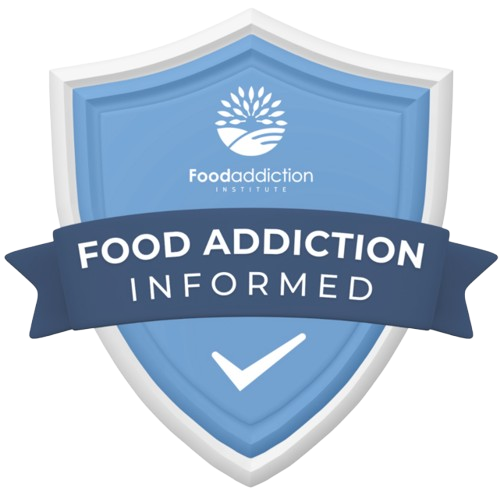
It is a substance use disorder, as yet institutionally unrecognized, defined by a biochemical sensitivity to some foods, food-like substances, and behaviors.
There is a significant degree of overlap between Food Addiction and eating disorders; you don't have only one or only the other. But Food Addicts have a biochemical sensitivity to some substances that other disordered eaters don't.
Though some substances, such as refined sugar, are cited by many Food Addicts, the fact is that trigger foods vary from person to person. By seeking treatment and/or finding community with others who have self-identified as having Food Addiction, they can begin to explore what their own trigger foods might be.
Abstain from it. Many in the world of nutrition advocate for moderation, and that can work for many people. But those with Food Addiction find they are happier when they are free from their triggers — even if they still think those foods taste good.
Well, perhaps, for some. Many with Food Addiction have emotional and spiritual deficits that intertwine with how, when, and what they eat. By addressing those — by engaging in communities of others who can relate to their struggles, by working with professionals, or through other means — they are much better prepared to make sane and healthy food choices, no matter the moment's circumstances.
There's the condition, and there's what the condition is called. These name changes are connected to efforts - that we endorse completely! - to have the condition recognized in the diagnostic manuals of the American Psychiatric Association and the World Health Organization so that, among other effects, Food Addiction treatment will be reimbursable by insurance. The Food Addiction Institute believes that ultra-processed foods play a very strong role in Food Addiction, but that Food Addiction is not limited to ultra-processed food.
Science does not yet know the effects of long-term exposure and other details, but they certainly seem to be helping a great many people. Such medications are akin to bariatric surgery in that they address physical manifestations of overeating. But what is driving people who qualify for such medical interventions, and can physical interventions address those factors? Many addicts find relief by also addressing the emotional, mental, and spiritual factors that drove them. Practicing abstinence reinforces those efforts, and those efforts reinforce abstinence.
Yes! Go here and read the ever-growing collection of peer-reviewed articles. Research shows that some foods and food-like substances light up the same areas of the brain that cocaine, alcohol, and other substances and behaviors do.
That's true. Addictive substances affect addicts in different intensities, and drive addicts to different behaviors. But one need only look to the World Health Organization — for statistics on how fast obesity is increasing in all populations, or how those with obesity die sooner on average than those without it — to know that the effects on Food Addicts are substantial enough.
Excellent question! And, absolutely not. Disordered eating arises from many causes. What raises Food Addiction to the level of substance-use disorder is the biochemistry involved in trigger foods. Taking treatment for Food Addiction will likely help anyone who suffers from disordered eating, but is a must for those who experience the phenomenon of craving.
hen a food-use disorder is recognized, treatment for it will be reimbursable by insurance. Food Addiction treatment has existed for decades and helped thousands, but it has remained out of the financial reach of most people, and placed a heavy financial burden on the rest.
People are individuals, and it's almost impossbile to craft a complete list. But here are three to start: Getting a food one craves, no matter the time of day or night; grazing (eating/snacking all day long); and volume eating, which may be bingeing for more than two hours.
It is a substance use disorder, as yet institutionally unrecognized, defined by a biochemical sensitivity to some foods and food-like substances.
Well, maybe it's not the best name, because, for example, Alcoholics Anonymous isn't called "Fluids Anonymous." People with addictions do need to eat and drink, but have to be careful not to ingest substances that lead them into physical and emotional pain.
Well, maybe it's not the best name, because, for example, alcoholics anonymous isn't called "Fluids Anonymous." People with addictions do need to eat and drink, but have to be careful not to ingest substances that lead them into physical and emotional pain.
Though some substances, such as refined sugar, are cited by many food addicts, the fact is that trigger foods vary from person to person. By seeking treatment and/or finding community with others who have self- identified as having Food Addiction, they can begin to explore what their own trigger foods might be.
Abstain from it. Many in the world of nutrition will advocate for moderation, and that works for many who have eating disorders. But those with Food Addiction find they are happier when they are free from their problem foods, regardless of whether those foods still appeal to them.
Well, perhaps, for some. Many with Food Addiction have emotional and spiritual deficits - all up to each individual to explore, consider, and accept and they benefit from professional treatment and engaging in community with others who self-identify as having the same or similar struggles.
There's the condition, and there's what the condition is called. These name changes are connected to efforts - that we endorse completely! - to have the condition recognized in diagnostic manuals so that, among other effects, Food Addiction treatment will be reimbursable by insurance. The Food Addiction Institute believes that ultra-processed foods play a very strong role in Food Addiction, but that Food Addiction is not limited to ultra-processed food.
We do not hold the corner on what is best for everyone. But just like bariatric surgery, such drugs may address the physical manifestations of overeating, without addressing the reasons why people reached to the point of needing drugs or surgery. Many addicts of many substances and behaviors have found relief by addressing the emotional, mental, and spiritual factors that led them to act out in the first place. Practicing abstinence reinforces those efforts, and those efforts reinforce abstinence.
Yes. Yes it does. Go here and read the dozens of peer-reviewed articles. Research shows that some foods and food-like substances light up the same areas of the brain that cocaine, alcohol, and other substances and behaviors do.
That's true. The substances and behaviors abused by addicts do affect them in different intensities, and therefore drive addicts to different behaviors. But one need only look to the world health organization for statistics on how fast obesity is increasing in all populations, or how those with obesity die sooner on average than those without it, to know that the effects on food addicts are substantial enough.
Excellent question! And, absolutely not. Disordered eating arises from many causes. What raises Food Addiction to the level of substance-use disorder is the biochemistry involved in trigger foods. Taking treatment for Food Addiction will likely help anyone who suffers from disordered eating, but is crucial to those who experience the phenomenon of craving.
Because when it is recognized in the canon of substance use disorders, treatment for it will be reimbursable by insurance. Food Addiction treatment has existed for decades, but it has remained out of the financial reach of most people, and placed a heavy financial burden on the rest.
Getting a food one craves, no matter the time of day or night; grazing (eating/snacking all day long); and volume eating, which may be bingeing for more than two hours, are three behaviors that help define Food Addiction.


All times are Eastern US [GMT+5]
Dietitian Theresa Wright hosts clients, former clients, and others. 7-8:30 p.m.
Dr. Marty Lerner and others of Milestones in Recovery hosts a 60-minute workshop for Milestones alumni, friends, and anyone interested. Mondays, 6:30 p.m.
Monday 8-9 am, Wednesday 8-9 pm, Saturday 11:30 am-12:30 pm, Sunday 7-8 pm.
Second Tuesday of each month. 8 pm-9 pm.
